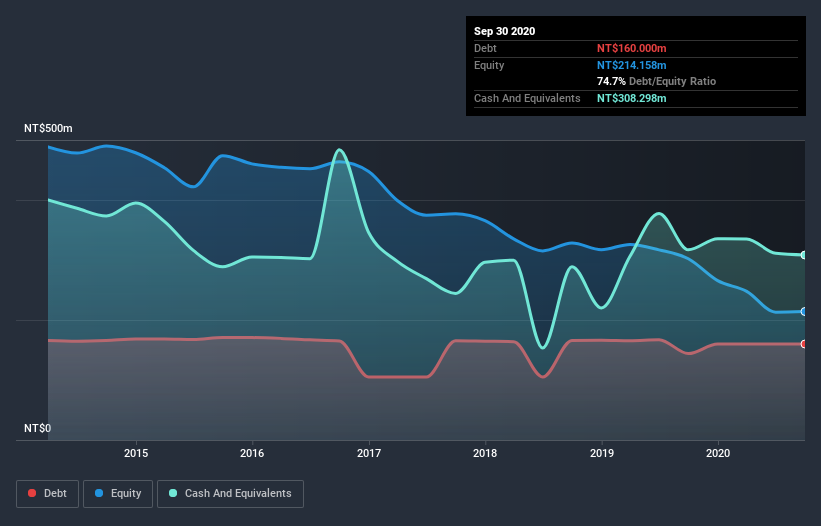Legendary fund manager Li Lu (who Charlie Munger backed) once said, 'The biggest investment risk is not the volatility of prices, but whether you will suffer a permanent loss of capital.' So it might be obvious that you need to consider debt, when you think about how risky any given stock is, because too much debt can sink a company. We can see that Airlux Electrical Co., Ltd. (GTSM:4609) does use debt in its business. But the real question is whether this debt is making the company risky.
When Is Debt Dangerous?
Generally speaking, debt only becomes a real problem when a company can't easily pay it off, either by raising capital or with its own cash flow. In the worst case scenario, a company can go bankrupt if it cannot pay its creditors. However, a more common (but still painful) scenario is that it has to raise new equity capital at a low price, thus permanently diluting shareholders. Of course, plenty of companies use debt to fund growth, without any negative consequences. When we examine debt levels, we first consider both cash and debt levels, together.
See our latest analysis for Airlux Electrical
What Is Airlux Electrical's Debt?
You can click the graphic below for the historical numbers, but it shows that as of September 2020 Airlux Electrical had NT$160.0m of debt, an increase on NT$144.0m, over one year. But on the other hand it also has NT$308.3m in cash, leading to a NT$148.3m net cash position.

A Look At Airlux Electrical's Liabilities
Zooming in on the latest balance sheet data, we can see that Airlux Electrical had liabilities of NT$356.8m due within 12 months and liabilities of NT$261.0m due beyond that. Offsetting these obligations, it had cash of NT$308.3m as well as receivables valued at NT$134.5m due within 12 months. So it has liabilities totalling NT$175.0m more than its cash and near-term receivables, combined.
While this might seem like a lot, it is not so bad since Airlux Electrical has a market capitalization of NT$353.4m, and so it could probably strengthen its balance sheet by raising capital if it needed to. But we definitely want to keep our eyes open to indications that its debt is bringing too much risk. Despite its noteworthy liabilities, Airlux Electrical boasts net cash, so it's fair to say it does not have a heavy debt load! There's no doubt that we learn most about debt from the balance sheet. But it is Airlux Electrical's earnings that will influence how the balance sheet holds up in the future. So when considering debt, it's definitely worth looking at the earnings trend. Click here for an interactive snapshot.
Over 12 months, Airlux Electrical made a loss at the EBIT level, and saw its revenue drop to NT$346m, which is a fall of 47%. To be frank that doesn't bode well.
So How Risky Is Airlux Electrical?
By their very nature companies that are losing money are more risky than those with a long history of profitability. And in the last year Airlux Electrical had an earnings before interest and tax (EBIT) loss, truth be told. Indeed, in that time it burnt through NT$27m of cash and made a loss of NT$80m. With only NT$148.3m on the balance sheet, it would appear that its going to need to raise capital again soon. Summing up, we're a little skeptical of this one, as it seems fairly risky in the absence of free cashflow. There's no doubt that we learn most about debt from the balance sheet. However, not all investment risk resides within the balance sheet - far from it. For instance, we've identified 2 warning signs for Airlux Electrical (1 shouldn't be ignored) you should be aware of.
If you're interested in investing in businesses that can grow profits without the burden of debt, then check out this free list of growing businesses that have net cash on the balance sheet.
If you decide to trade Airlux Electrical, use the lowest-cost* platform that is rated #1 Overall by Barron’s, Interactive Brokers. Trade stocks, options, futures, forex, bonds and funds on 135 markets, all from a single integrated account. Promoted
New: Manage All Your Stock Portfolios in One Place
We've created the ultimate portfolio companion for stock investors, and it's free.
• Connect an unlimited number of Portfolios and see your total in one currency
• Be alerted to new Warning Signs or Risks via email or mobile
• Track the Fair Value of your stocks
This article by Simply Wall St is general in nature. It does not constitute a recommendation to buy or sell any stock, and does not take account of your objectives, or your financial situation. We aim to bring you long-term focused analysis driven by fundamental data. Note that our analysis may not factor in the latest price-sensitive company announcements or qualitative material. Simply Wall St has no position in any stocks mentioned.
*Interactive Brokers Rated Lowest Cost Broker by StockBrokers.com Annual Online Review 2020
Have feedback on this article? Concerned about the content? Get in touch with us directly. Alternatively, email editorial-team (at) simplywallst.com.
About TPEX:4609
Airlux Electrical
Engages in the manufacture and sale of electrical appliances in China and internationally.
Excellent balance sheet with low risk.
Market Insights
Community Narratives



